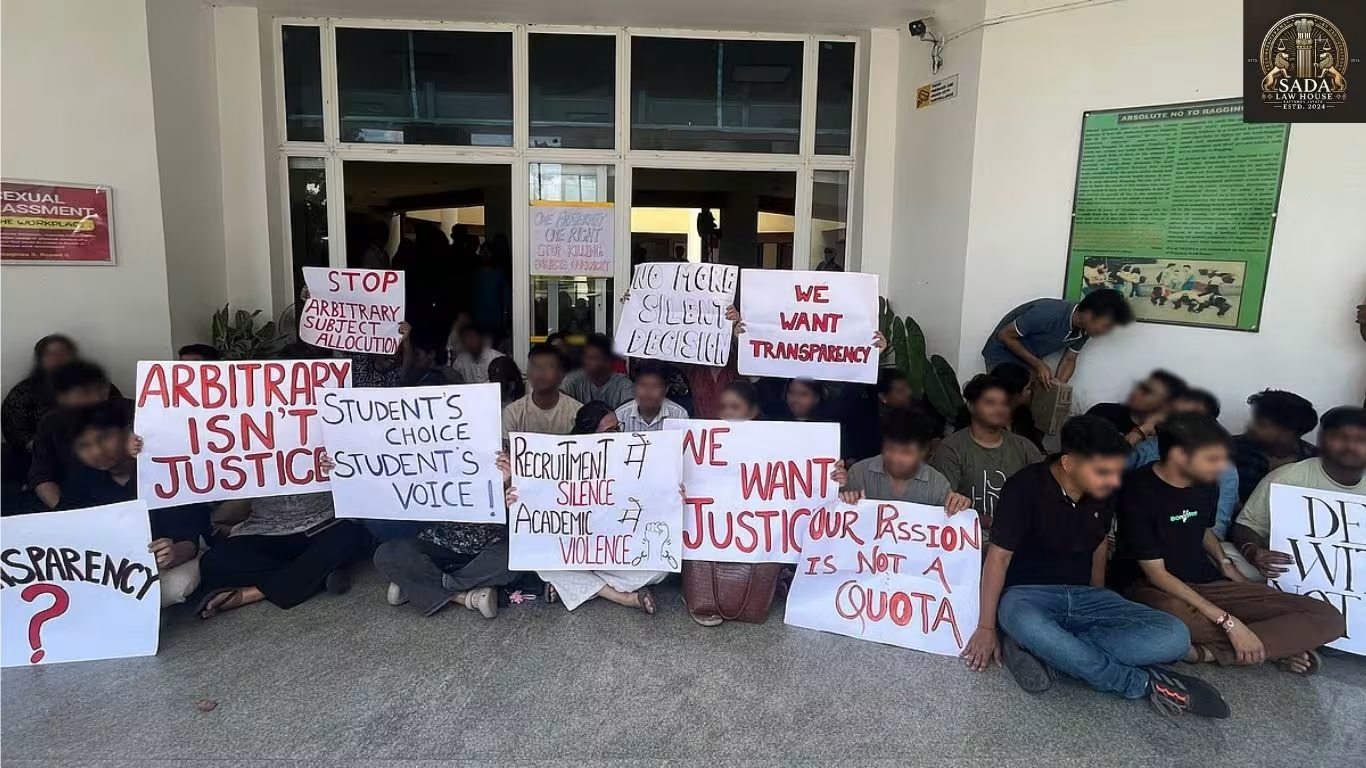Degrees on Protest, Justice on Hold: The Silent Crisis of Overnight Approved Law Colleges
- Kashak Agarwala
- 14 September 2025

Introduction
Fred Rodell, one of the fiercest critics of legal academia, once wrote that law schools merely grant diplomas of empty value. His words ring prophetic in light of the Shri Ramswaroop Memorial University (SRMU), Barabanki episode, where decades of regulatory apathy and days of student protests culminated in a sudden midnight recognition by the Bar Council of India (BCI).
Background
The crisis began when SRMU students discovered that their law courses lacked BCI recognition. On August 18, 2025, students raised concerns. By September 1, they were on the streets, demanding answers. Protests intensified the following day, leading to clashes with police, reports of students being roughed up, expelled, or detained, and fears that their degrees were worthless. Chief Minister Yogi Adityanath swiftly suspended a Circle Officer, ordered inquiries into both police excesses and the university’s law programs, and promised accountability. On September 3, in a dramatic twist, the BCI granted provisional one-year approval, retroactively regularising admissions for 2023-24 and 2024-25 batches. Hours later, an FIR was filed against SRMU by the state government.
Legal Framework and Precedents
The timing and manner of BCI’s approval raised questions of transparency. Under Section 7(1)(h) of the Advocates Act, 1961, the BCI must recognise universities whose law degrees qualify graduates for enrolment. Rule 3 of the BCI Rules of Legal Education, 2008, mandates annual notifications of approved colleges. Section 22 of the UGC Act, 1956 restricts valid degree issuance to recognised universities. Judicial precedents reinforce this framework: BCI v. Bonnie Foi Law College (2012) upheld BCI’s pre-enrolment powers; in Gunderson v. Committee of Management Anuragi Devi Degree College (2016), the UP Court condemned unapproved admissions; and in Arulmigu Kalasalingam College of Education, the Supreme Court held degrees during withdrawn recognition periods void.
False Representation and Misleading Claims
SRMU worsened the crisis by misrepresenting its status. Its website falsely listed BCI approval under “Institutional Approvals,” misleading students into believing their courses were compliant. This amounted to fraud on the public, undermining trust and exposing students to irreparable harm.
Students as Petitioners Before Advocates
Ironically, SRMU law students’ first legal battle was not moot court but fighting for their own legitimacy. Instead of studying jurisprudence, they drafted petitions, complaints, and protest slogans—litigating their right to a recognised education in real time.
Larger Implications
India has over 1,700 BCI-approved law colleges producing nearly 90,000 graduates annually. Delays or lapses in recognition, as in SRMU, risk devaluing the legal profession and reducing compliance to symbolic gestures. Such failures erode confidence in regulatory systems and jeopardise careers.
A Question of Priorities
While the BCI strictly enforces standards for practising lawyers through Certificates of Practice and the All India Bar Examination, enforcement for institutions is sluggish and reactive. The SRMU case highlights this imbalance—students pay the price for regulatory delay while practitioners face immediate discipline.
Behind Recognition: Politics and Protests
The overnight approval of SRMU law courses was clearly accelerated by student agitation, political embarrassment, and administrative pressure. This raises a deeper concern: what happens to students in less prominent institutions who lack political backing or visibility? Without systemic reform, their futures remain uncertain.
Current Situation
As of September 3, SRMU law students have temporary relief with a one-year provisional approval, but their long-term fate depends on compliance and further regulatory review. Investigations against the university are ongoing, and questions about accountability remain unanswered.
Conclusion
The SRMU episode exposes structural fractures in India’s legal education system. A reactive regulator and opaque processes risk producing generations of law graduates uncertain about the validity of their degrees. Unless regulatory responsibility, transparency, and timeliness are enforced, India’s legal profession faces a slow erosion of credibility and trust.






